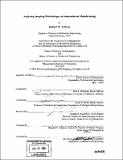Analyzing sampling methodologies in semiconductor manufacturing
Author(s)
Anthony, Richard M. (Richard Morgan), 1971-
DownloadFull printable version (7.280Mb)
Other Contributors
Leaders for Manufacturing Program.
Advisor
Sara L. Beckman and David E. Hardt.
Terms of use
Metadata
Show full item recordAbstract
This thesis describes work completed during an internship assignment at Intel Corporation's process development and wafer fabrication manufacturing facility in Santa Clara, California. At the highest level, this work relates to the importance of adequately creating and maintaining data within IT solutions in order to receive the full business benefit expected through the use of these systems. More specifically, the project uses, as a case example, the sampling methodology used in the fab for metrology data collection to show that significant issues exist relating to the software Various recommendations were undertaken to improve the application's effectiveness. As part of this effort, plans for an online reporting tool were developed allowing much greater visibility into the system's ongoing performance. Initial data updates and other improvements resulted in a reduction in both product cycle times and required labor hours for metrology operations. application database and business processes concerning data accuracy and completeness. The organizational challenges contributing to this problem will also be discussed. Without a rigorous focus on the accuracy and completeness of data within manufacturing execution systems, the results of continuous improvement activities will be less than expected. Furthermore, sharing information relating to these projects across geographical boundaries and business units is vital to the success of manufacturing organizations.
Description
Thesis (M.B.A.)--Massachusetts Institute of Technology, Sloan School of Management; and, (S.M.)--Massachusetts Institute of Technology, Dept. of Mechanical Engineering; in conjunction with the Leaders for Manufacturing Program at MIT, 2004. Includes bibliographical references (p. 81-83).
Date issued
2004Department
Leaders for Manufacturing Program at MIT; Massachusetts Institute of Technology. Department of Mechanical Engineering; Sloan School of ManagementPublisher
Massachusetts Institute of Technology
Keywords
Sloan School of Management., Mechanical Engineering., Leaders for Manufacturing Program.